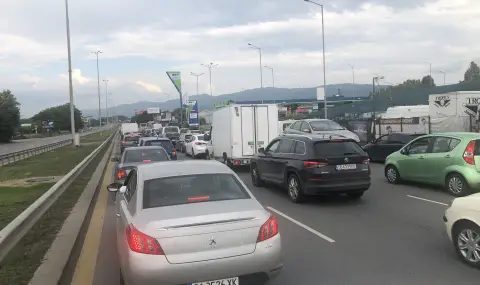Bulgaria turns out to be one of the countries with the worst traffic jams, and one Bulgarian city ranks in the top 10 cities with the worst traffic in the world, and it is not Sofia. To conduct this study, the “Tom Tom” agency traveled 700 million kilometers in 62 countries on six continents. The result - Plovdiv is the sixth most congested city in the world, while the capital Sofia is in 52nd place, NOVA reported.
The result of the NOVA check - in Sofia, 5 kilometers by car are covered in 17 minutes shortly before 6 p.m. In the city under the hills, these 5 kilometers at the same time are taken in 23 minutes. Exactly 5 minutes difference. Probably for these reasons, Plovdiv residents spend an average of three hours more than Sofia residents trying to overcome city traffic jams.
In practice, Plovdiv residents spend 107 hours a year in their cars. And Sofia residents drove in traffic jams for 104 hours over the past 12 months. And so, shortly before Plovdiv, cities such as Bucharest and Bangkok rank. First place goes to Mexico City.
In Sofia, drivers calculate how much their way to work costs with and without traffic. “About half an hour. I work at Sofia Airport and it's half an hour. Without traffic - 8 minutes”, says Dimo Rusev.
Taxi drivers complain that traffic is having a bad effect on their business. “Many people have already given up on taxis because the prices have gone up. They sit at the bus stop and wait for the bus to arrive,” says Radoy Rachkov.
For others, it has a bad effect on their nerves. “I read an English study in which they say that if the driver swears, it releases stress in them,” shares Nikolay Evtimov. And in Plovdiv they release stress. “I have come to vulgar expressions, but it doesn’t help. Only laws,” say the drivers. But they also find solutions – by riding a bike.
The Institute of Transport Infrastructure is not surprised by the results. Because it is not the first year that Plovdiv has been ranked first. “We are not surprised that Plovdiv is growing. It is the second largest city and we need to stimulate it, but infrastructure cannot hinder the growth of a city,” says Dr. Eng. Hristo Grozdanov from the Institute of Transport Infrastructure.
The municipality of Plovdiv has its own explanation for how the city ended up at the top of the world in terms of congestion. “We must take into account the fact that this study was conducted in 2022-2023, when most of Plovdiv's streets were under repair”, commented Deputy Mayor for Transport Erol Sadakov.
Experts advise Plovdiv to take an example from Thessaloniki and build a metro. “Nothing is being done, there are fragmentary ideas, there are plans for a light metro and trams, but nothing has been developed”, also points out Eng. Grozdanov.
“There is a metro project, but above ground and this project is being run by the National Railways. Citizens should start using public transport, which is already regular and performs over 95% of the lines,” says the deputy mayor.
For the next experiment, NOVA reporters set off by public transport. They travel the same 5 kilometers. This time, however, by metro. There is no metro in Plovdiv, but there is bus 27, which runs every 15 minutes. The metro takes 13 minutes, or 4 minutes faster than by car.
In Plovdiv, the 5 kilometers by bus are covered in 35 minutes. About 10 minutes slower than by car. Maybe because there are no bus lanes in the city. With public transport or by personal transport - there is no time. And everyone does their own calculations.
